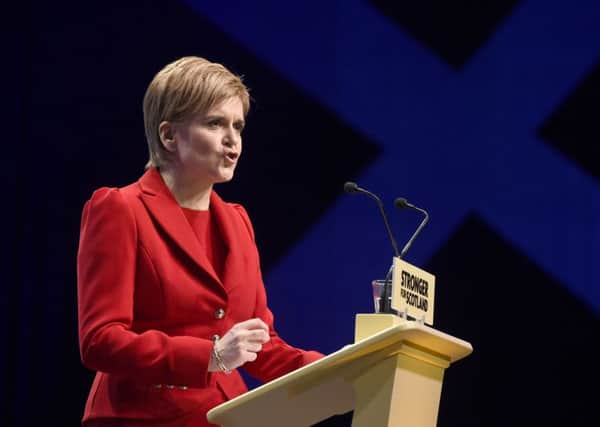Ian Swanson: Risk/reward tactic fails to get Nationalists' vote


It’s the party’s hashtag on social media and was the mantra repeated at the end of every speech at their pre-election conference. But now academics have warned the “Both Votes SNP” message may undermine the Nationalists’ chance to maximise support for independence in the next Scottish Parliament.
Telling supporters to vote the same way in both the constituency and regional list votes for Holyrood is nothing new and not unnatural. Any party wants all the votes it can get in an election.
Advertisement
Hide AdAdvertisement
Hide AdBut a study carried out by polling guru Professor John Curtice and published this week sounded a cautionary note, pointing out that for the Nationalists, urging voters to use both votes for the SNP may not be the best tactic.
This is simply because, if the polls are right, the SNP is on course to win almost every one of the 73 constituency seats in the parliament and would then qualify for few if any seats on the regional lists, which are used to bring parties’ share of MSPs closer to their overall share of the vote.
Therefore, choosing the SNP on the list could be viewed as a “wasted vote” and Nationalist supporters might be better advised to use their list vote for other candidates who also back independence – namely the Greens or the left-wing alliance Rise (Respect, Independence, Socialism and Environmentalism).
Prof Curtice used the example of a hypothetical result in Lothian to illustrate his point. It projected the SNP winning all nine constituency seats and taking 41 per cent of the list votes and showed the Greens, with 11.6 per cent of list votes, narrowly missing out on a second seat.
Advertisement
Hide AdAdvertisement
Hide AdProf Curtice said: “If just 0.5 per cent of voters had voted on the list ballot for the Greens rather than the SNP, the Nationalists’ allies on the constitutional question would have secured another seat while their ‘defection’ would not have cost the SNP anything.”
The SNP, however, will not hear of this approach. It’s too risky, members say. Nothing can be taken for granted about any seat and this kind of tactical voting carries the danger of helping the opposition.
And the Nationalists are not that keen to assist the smaller parties, even if they do back independence. The party would rather see votes “wasted” on the SNP than going to anyone else.
Prof Curtice admits there are risks for SNP supporters who give their list vote to the Greens or Rise – what if the SNP isn’t really doing as well as the polls suggest? Or what if it is doing even better and could after all qualify for some list seats?
Advertisement
Hide AdAdvertisement
Hide AdMost polls currently show slightly fewer people planning to vote SNP on the list than in the constituency, which suggests that they may have worked out Prof Curtice’s scenario for themselves, or that they would prefer to vote for another party anyway.
The Greens and Rise, after all, are not running for election as Nicola Sturgeon’s little helpers. They may agree on the principle of independence, but on many other points they take clearly different positions.
Indeed, the Greens’ campaign explicitly argues that the SNP is almost certain to form the government, but a strong group of Green MSPs would help pressure it to adopt bolder policies on issues like fracking, land reform and more. Rise could make a similar case.
Independence supporters who believe the SNP is being too timid might feel they have a double reason to shun the Nationalists’ advice on the list vote: not only to ensure it is not “wasted” but also to use it to push for more radical policies.